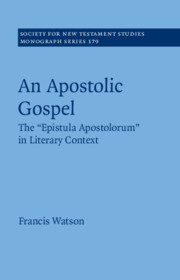Book contents
- An Apostolic Gospel
- Society for New Testament Studies
- An Apostolic Gospel
- Copyright page
- Contents
- Acknowledgements
- Introduction
- Part I Recovering the Epistula
- 1 An Ambiguous Legacy: The Epistula Apostolorum and its Editors
- 2 Translation
- Part II Themes
- Part III Additional Notes on Text and Translation
- Appendix: The Galilean Discourse
- Bibliography
- Author Index
- Subject Index
1 - An Ambiguous Legacy: The Epistula Apostolorum and its Editors
from Part I - Recovering the Epistula
Published online by Cambridge University Press: 13 March 2021
- An Apostolic Gospel
- Society for New Testament Studies
- An Apostolic Gospel
- Copyright page
- Contents
- Acknowledgements
- Introduction
- Part I Recovering the Epistula
- 1 An Ambiguous Legacy: The Epistula Apostolorum and its Editors
- 2 Translation
- Part II Themes
- Part III Additional Notes on Text and Translation
- Appendix: The Galilean Discourse
- Bibliography
- Author Index
- Subject Index
Summary
This chapter reconstructs the modern editorial history of the Epistula Apostolorum, with a particular focus on the origins of the unsatisfactory formatting of translations of this work. In collections of so-called New Testament Apocrypha it is presented in two independent and poorly co-ordinated columns, one translated from the Ethiopic version, the other from the Coptic. This two-column format makes the text difficult to use, and it is probably the main reason for its scholarly neglect. It derives from the editio princeps of 1919 and reflects the desire of the editor – the German Coptologist Carl Schmidt – to preserve the integrity of the partially extant Coptic text rather than using the complete Ethiopic text to produce a critical translation which would correspond as closely as possible to the lost Greek original. Schmidt only became aware of the existence of the Ethiopic version at a late stage and failed to collaborate effectively with Louise Guerrier, editor of the Ethiopic version. In subsequent translations the two-column format has been retained under the erroneous impression that the Ethiopic and Coptic versions represent different recensions of the Epistula.
- Type
- Chapter
- Information
- An Apostolic GospelThe 'Epistula Apostolorum' in Literary Context, pp. 15 - 41Publisher: Cambridge University PressPrint publication year: 2020



